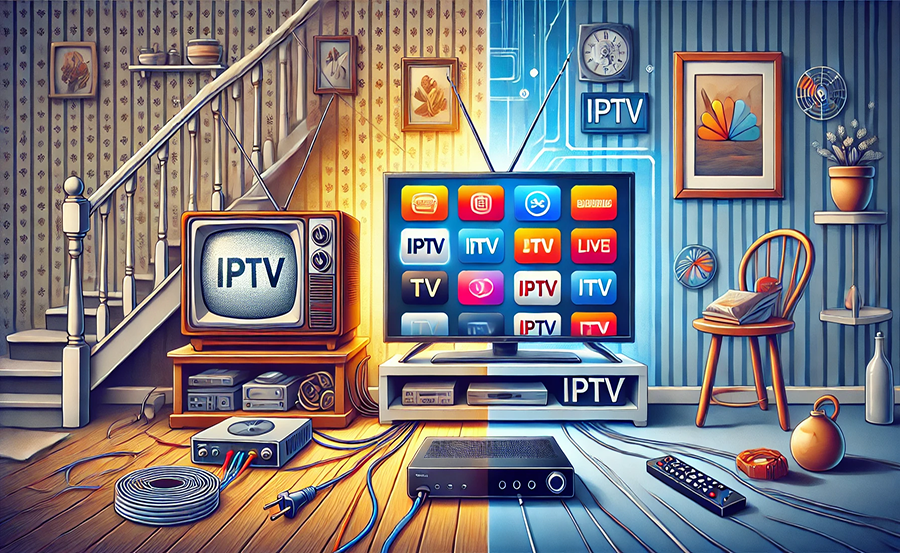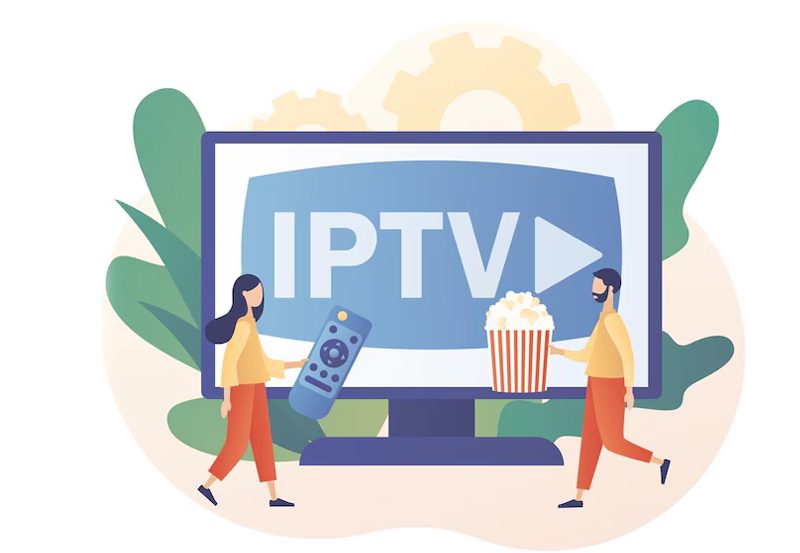In an era where digital entertainment is rapidly evolving, the shift from traditional cable TV to IPTV is undeniable. As viewers are increasingly drawn to IPTV’s flexibility and vast content variety, one aspect that often goes unnoticed is its superior security features. More than just a technological trend, IPTV security is revolutionizing the way we view and protect our entertainment content.
Understanding IPTV and Its Appeal
IPTV, or Internet Protocol Television, is a method of streaming television and other media content over the internet. Unlike cable TV, which relies on physical infrastructures like coaxial cables and broadcasts through satellite signals, IPTV uses the internet to deliver content, offering a more dynamic and flexible viewing experience. With IPTV, users can enjoy a wide range of channels, movies, and series accessible on various devices, from smartphones to smart TVs.
Moreover, IPTV’s appeal lies in its ability to provide tailored content. With a plethora of packages available, users can subscribe to Premium IPTV services that cater to their specific content preferences, be it live sports, the latest movies, or niche interest channels. This customization is something traditional cable simply can’t match.
Quick Tip:
Stream local and international TV with UK IPTV and get access to all your favorite channels.
The Benefits of IPTV Over Cable TV
One of the primary advantages of IPTV is the ease of access to content, which can be streamed from anywhere with an internet connection. This flexibility is complemented by often more competitive pricing compared to cable packages. Moreover, IPTV services frequently offer better picture quality and sound, as the stream is directly internet-based rather than subject to the limitations of cable broadcast.
Another notable benefit is the user-friendly interface that many IPTV services provide. With intuitive navigation and personalized recommendations, viewers can Stream Smarter, choosing content that truly matters to them with no unnecessary fluff. This stands in stark contrast to the sometimes cumbersome, limited interfaces of conventional cable TV setups.
Cost Efficiency and Customization
With Premium IPTV, users aren’t just paying for content; they’re investing in a service that offers both value and versatility. Unlike cable subscriptions, which often come bundled with channels the user has no interest in, IPTV services allow for customization. This means individuals only pay for what they wish to watch, saving both money and frustration.
This cost efficiency is paired with IPTV’s flexibility, allowing users to pick and choose their preferred viewing platforms. From streaming right from a mobile device during a commute to setting up a full home cinema experience, IPTV provides an adaptable solution for all kinds of users.
Security in IPTV – A Game-Changer
While the flexibility and customization options of IPTV are well-known, its security features often go underappreciated. In contrast to cable TV, where the security is intrinsic thanks to its physical wiring and limited access channels, IPTV’s security must handle the open nature of the internet, thus necessitating more advanced protective measures.
These advanced security measures ensure that users can Enjoy IPTV Better, without the constant worry of data breaches or unauthorized access. IPTV services are equipped with features that provide safe streaming environments, keeping users’ personal data and viewing habits secure.
Encryption Techniques
One of the most significant security advantages IPTV boasts over traditional cable TV is the use of encryption. By encrypting the data streams, IPTV services prevent unauthorized access and ensure that the data being transmitted is only available to verified users. This is particularly important in protecting premium content like movies and series, which require heightened security against piracy.
Standard encryption methods, along with continuous updates, mean that IPTV services can stay ahead of potential threats. As security protocols evolve, IPTV providers can implement these changes swiftly over the network, ensuring minimal downtime and maximum protection for subscribers.
Two-Factor Authentication
Besides encryption, another layer of security comes from two-factor authentication (2FA). This feature adds an extra step of verification, providing assurance that only authorized users can access the IPTV service. This is remarkably effective in preventing unauthorized users from hijacking streaming accounts, which is a growing concern in today’s digital age.
By requiring not just a password but a secondary confirmation—such as a code sent to a user’s phone—IPTV providers create a more robust security framework. This added layer of protection fosters trust in users, contributing to an overall better IPTV experience.
Privacy Concerns and IPTV
Another dimension of security that IPTV addresses is user privacy. With the digital landscape increasingly prone to breaches, IPTV services have prioritized privacy protection to assure subscribers that their data is secure while they enjoy their favorite content.
Data Protection Policies
Several IPTV services are at the forefront of adopting stringent data protection policies, aligning with global regulations such as GDPR. These policies govern how user data is collected, stored, and used, ensuring that privacy isn’t just an afterthought but a key component of the service offered. This proactive stance sets IPTV apart as a leader in secure content streaming.
Furthermore, clear and transparent privacy policies mean users are more informed about how their data is handled. Coupled with options to customize data sharing settings, IPTV provides an environment where users can feel more secure about their digital footprint.
Anonymous Viewing Options
Some advanced IPTV services even offer anonymous viewing options. This feature allows users to stream content without linking their activities to their personal information, providing an extra layer of privacy. Such anonymity options are rarely offered in traditional television services and further highlight IPTV’s commitment to user privacy.
These settings are flexible, often allowing viewers to choose the degree of privacy they feel comfortable with, enhancing their overall security while enjoying the full spectrum of IPTV content available.
Conclusion? Look Beyond – The Future Awaits
IPTV’s adoption isn’t just about moving from old to new technology; it’s about improved user experience through better security and privacy features. As streaming continues to overtake traditional methods of broadcast, IPTV is uniquely positioned to offer not only a wider range of content but a safer and more personalized viewing experience.
Transitioning to IPTV Securely
For those considering making the switch from cable TV, understanding these security features should ease common fears about privacy and data protection. Equipped with enhanced encryption, two-factor authentication, and respectful privacy policies, IPTV offers a cybersecurity framework that traditional TV simply cannot rival.
As viewers escalate their content demands and security concerns, IPTV’s robust system acts as a beacon leading the broadcast industry towards a more secure, user-friendly future. With solutions that come as rapidly as the challenges they aim to fix, IPTV is set to remain at the forefront of not only entertainment but digital security.
A Growing Trend with Promising Future
The evolving landscape of internet television suggests that IPTV will continue to devour market share from cable TV. This isn’t just due to the variety of content it offers but because of the unprecedented level of security and control it gives viewers over their viewing experience. Looking ahead, IPTV providers must sustain their investment in these critical areas, seeing them not as optional add-ons but as fundamental to the service they provide.
By doing so, IPTV not only promises a more colorful, varied tapestry of content but does so while safeguarding the privacy and security of its users—a parameter that will surely garner trust and loyalty from audiences worldwide.
FAQs About IPTV Security Features

- What makes IPTV more secure than cable TV?IPTV employs advanced security measures such as data encryption and two-factor authentication, which are not typically available in standard cable TV services.
- How does IPTV ensure privacy?IPTV services adopt stringent data protection policies and offer anonymous viewing options, giving users control over their personal data and viewing habits.
- Is IPTV susceptible to hacking?While any online service can be a target, IPTV uses robust encryption and continuous security updates to protect against unauthorized access, making it significantly safer than older broadcast methods.
- Can I control what data IPTV providers collect?Yes, many IPTV providers offer settings that allow you to customize what data is collected and how it is used, in line with global data protection standards.
- Are there any risks associated with using IPTV services?As with any online platform, risks exist, but by choosing reputable providers with strong security measures, these risks can be minimized.
- Do all IPTV services offer two-factor authentication?No, not all services offer this feature. It’s recommended to choose a provider that includes additional security measures such as 2FA.
Installation Guide for TiviMate





